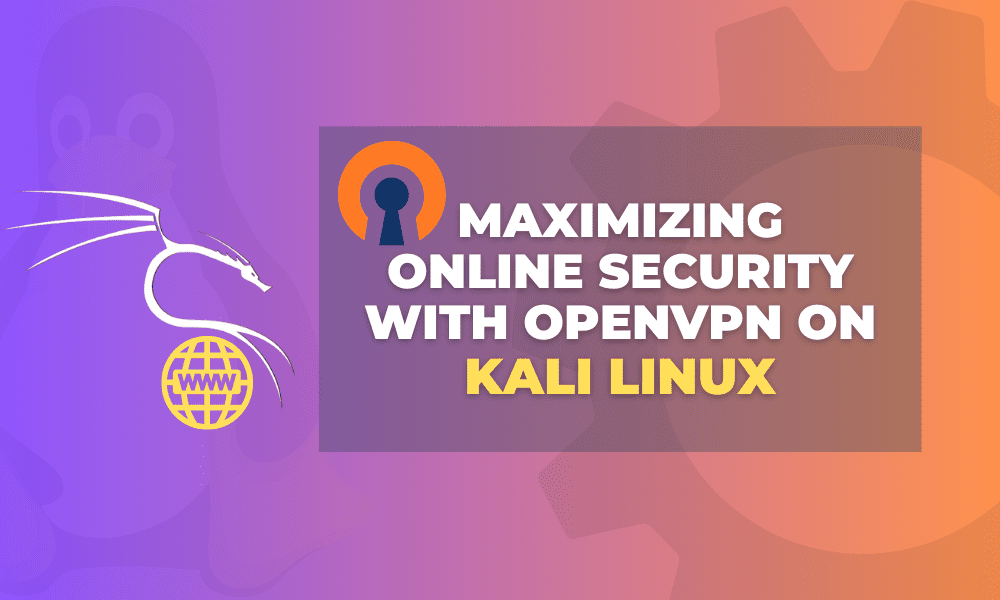In today’s digital age, ensuring the privacy and security of our online activities has become increasingly crucial. With the rise of cyber threats, surveillance, and data breaches, it is essential to take proactive steps to safeguard our online privacy. One effective solution is to utilize a virtual private network (VPN) like OpenVPN on Kali Linux. Kali Linux is a powerful tool that aligns perfectly with the goal of protecting our privacy. Developed by Offensive Security, Kali Linux is a robust and widely-used Debian-based distribution specifically designed for ethical hacking, network security assessments, and penetration testing.
Kali Linux provides a comprehensive toolkit of software and utilities that enable users to assess the security of their systems, identify vulnerabilities, and conduct various security-related tasks. It is trusted by security professionals, cybersecurity enthusiasts, and ethical hackers for its extensive tools and resources.
In this comprehensive article guide, we will explore the significance of online privacy, discuss the fundamental concepts of Kali Linux and OpenVPN, walk you through the installation process, explain how to connect to a VPN, and provide useful tips on using OpenVPN effectively.
Importance of Online Privacy
In the interconnected world, we live in, our online privacy is constantly at risk. From malicious hackers to government surveillance and invasive data collection by corporations, our personal information is vulnerable. Preserving online privacy is essential for maintaining our autonomy, security, and freedom of expression. By using OpenVPN on Kali Linux, you can take control of your online privacy and enjoy a more secure browsing experience. OpenVPN provides encryption and anonymity, permitting you to browse online without being tracked or monitored.
But why is online privacy so important in the first place? Our personal information is constantly under attack in an era of escalating cyber threats, pervasive surveillance, and rampant data breaches. Online privacy ensures that we have control over our digital lives, protecting us from potential harm and preserving our fundamental rights.
When we browse the internet, our online activities can be monitored and tracked by various entities, including government agencies, Internet Service Providers (ISPs), advertisers, and malicious hackers. They can gather our personal data, track our browsing habits, and potentially misuse or exploit the information they collect. This invasion of privacy compromises our security and undermines our freedom of expression and autonomy.
By leveraging Kali Linux and incorporating OpenVPN, an open-source virtual private network protocol, users can establish encrypted and secure connections to protect their online privacy effectively. OpenVPN enables users to create a private network within the public internet infrastructure, encrypting their internet traffic and routing it through secure tunnels. This ensures that sensitive information remains confidential, shielding it from prying eyes and potential eavesdroppers.
With Kali Linux and OpenVPN, individuals can take proactive measures to protect their online privacy. They can confidently browse the internet, access public Wi-Fi networks securely, and maintain anonymity by masking their real IP addresses and encrypting their data. This combination empowers users to regain control over their digital lives, enhancing their privacy and security in an increasingly interconnected world.
Maximizing online security with OpenVPN on Kali Linux
In the following sections, we will delve into the installation process of OpenVPN on Kali Linux, explore how to connect to a VPN and discuss essential tips for using OpenVPN effectively to safeguard your online privacy. Following these guidelines can fortify your defenses against potential threats and help you enjoy a safer and more private online experience.
Prerequisites
To proceed with setting up OpenVPN on Kali Linux, there are a few prerequisites you need to fulfill:
- Kali Linux: Ensure you have Kali Linux installed on your system. Kali Linux is a powerful, Debian-based distribution designed for penetration testing and network security assessments. It provides various tools and utilities for advanced users.
- OpenVPN: Install the OpenVPN software package, which provides the necessary tools and libraries to set up a VPN connection. OpenVPN is a widely used open-source VPN solution that offers robust encryption and secure communication over the internet. It is compatible with various operating systems, including Kali Linux.
Installing OpenVPN on Kali Linux
Now that you have Kali Linux ready let’s proceed with the installation of OpenVPN. Follow these steps:
- Update System: Open a terminal and run the following commands to update your system:
sudo apt update
sudo apt upgrade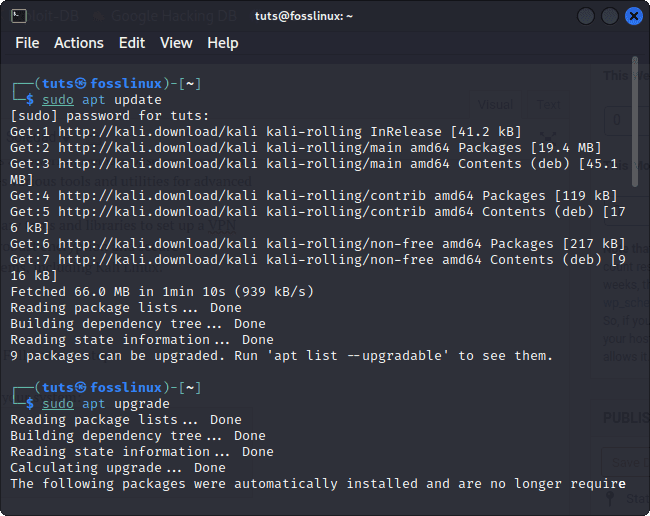
Update and upgrade system resources
- Install OpenVPN: Execute the command below to install OpenVPN on your Kali Linux system:
sudo apt install openvpn network-manager
Once the installation is done, restart your Kali Linux PC for the changes to take effect.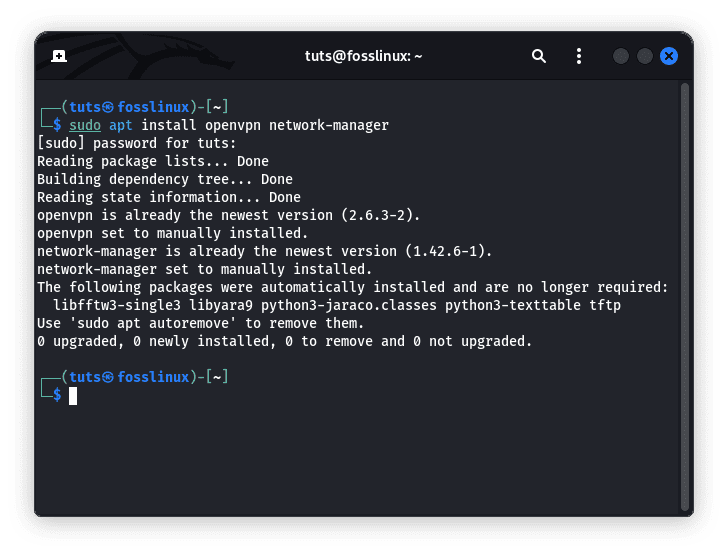
Install OpenVpn
- Verify Installation: After the installation process is complete, verify the installation by running:
openvpn --version
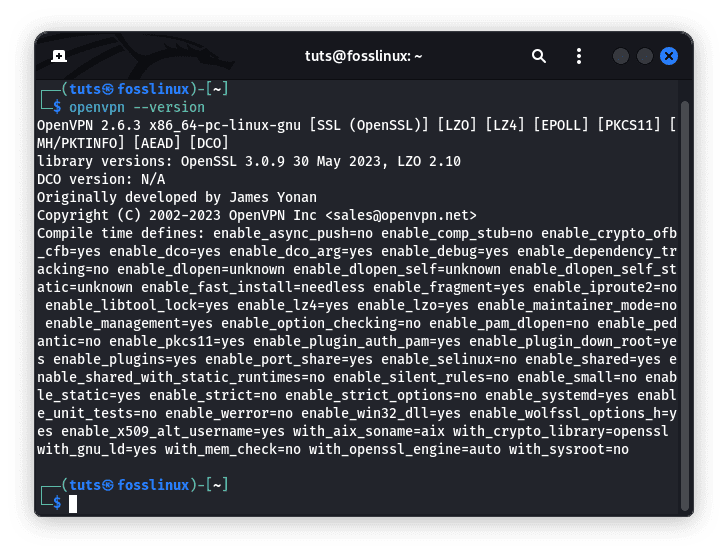
Check OpenVpn version
Configuring OpenVPN on Kali Linux
Once OpenVPN is installed, you must configure it to connect to a VPN service. Here’s how you can do it:
Step 1: Obtain VPN Configuration
Contact your VPN provider to obtain the necessary configuration files and credentials. These files typically include the VPN server address, authentication details, and encryption settings.
Step 2: Set Up OpenVPN Configuration Directory
Create a directory to store your OpenVPN configuration files. You can use the following command:
sudo mkdir /etc/openvpn/client
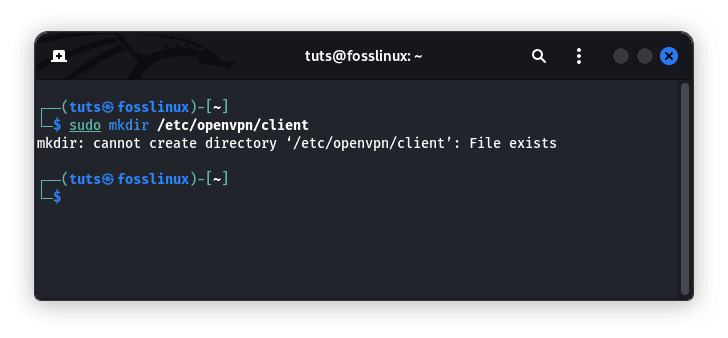
Create a directory to store OpenVpn config files
Note: You see the output above because the directory already exists in my Kali Linux OS.
Step 3: Copy Configuration Files
Copy the downloaded configuration files to the newly created directory. Use the following command, replacing <config-file.ovpn> with the actual configuration file name:
sudo cp <config-file.ovpn> /etc/openvpn/client/
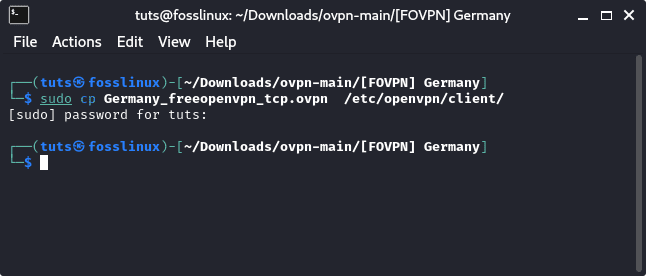
Copy openvpn config file to the client’s directory
Step 4: Adjust Configuration
Fire up the configuration file using a text editor and make any necessary modifications. Ensure the file contains the correct server address, authentication details, and encryption settings provided by your VPN provider.
Connecting to a VPN with OpenVPN
Once you have OpenVPN configured, you can connect to a VPN service using the following steps:
Step 1: Launch OpenVPN
Open a terminal and navigate to the OpenVPN configuration directory using the command:
cd /etc/openvpn/client
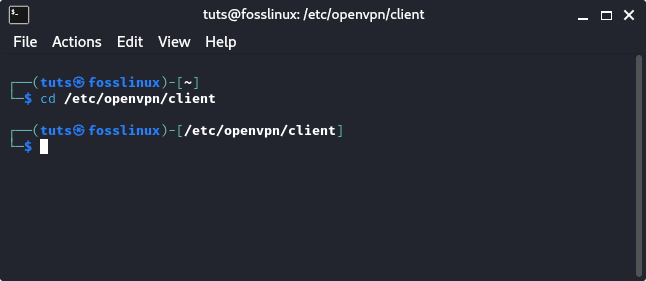
Navigate to the OpenVpn configuration directory
Step 2: Connect to VPN Server
Run the following command to initiate the VPN connection:
sudo openvpn <config-file.ovpn>
Replace <config-file.ovpn> with the name of your configuration file.
Example:
sudo openvpn Germany_freeopenvpn_tcp.ovpn
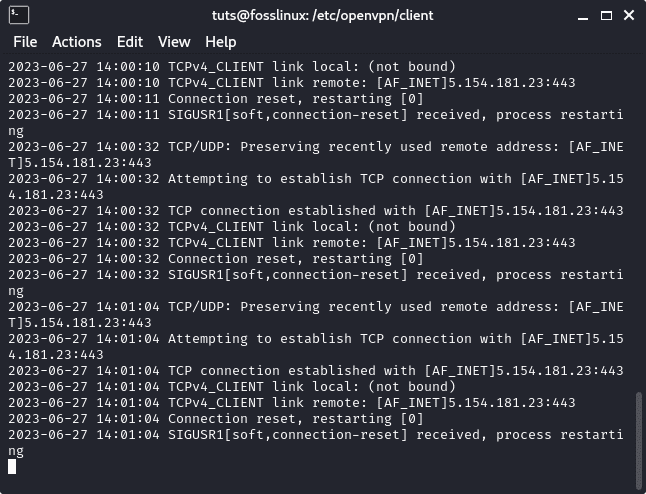
Connect to VPN server
Step 3: Enter Credentials
When prompted, enter your vpn username and password to establish the connection.
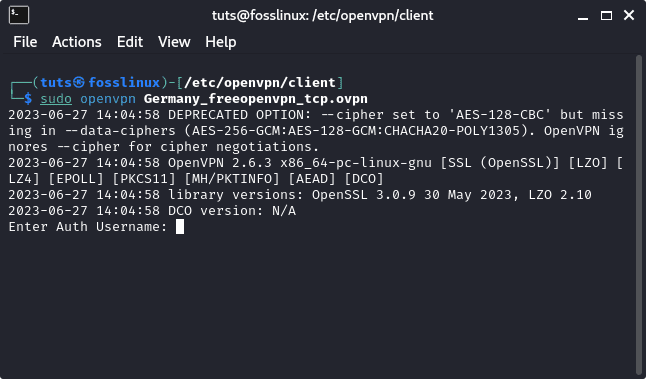
Input username and password
Step 4: Verify the Connection
Once connected, you will see logs indicating a successful connection. You can test your connection by visiting websites like whatismyip.com to verify that your IP address has changed.
Using OpenVPN Effectively
To make the most of OpenVPN and enhance your online privacy, consider the following tips:
- Use Strong Passwords: Create unique and robust passwords for your OpenVPN accounts to prevent unauthorized access. Avoid using common or easily guessable passwords.
- Enable Two-Factor Authentication (2FA): Implement an additional layer of security by enabling 2FA for your OpenVPN connections. This adds an extra verification step, making it more challenging for unauthorized individuals to gain access.
- Regularly Update OpenVPN: Stay up-to-date with the latest version of OpenVPN to ensure you benefit from the latest security patches and improvements. Regularly check for updates and install them promptly.
- Use Kill Switch: Enable the OpenVPN kill switch feature, which ensures that all internet traffic is blocked if the VPN connection drops until the connection is re-established. This prevents any data leakage through an unprotected connection.
- Select Secure VPN Servers: When connecting to a VPN, choose servers that prioritize security and privacy. Look for servers located in privacy-friendly jurisdictions and those that do not log user activity.
- Configure DNS Settings: Configure your DNS settings to use a secure and private DNS resolver, such as DNSCrypt or DNS over HTTPS (DoH). This ensures that your DNS queries are encrypted and not accessible to prying eyes.
Conclusion
In this guide, we explored the importance of online privacy and discussed how you could safeguard your online activities using OpenVPN on Kali Linux. We covered the prerequisites, walked through the installation process, explained how to configure and connect to a VPN, and provided tips on using OpenVPN effectively. By implementing these measures, you can take control of your online privacy and enjoy a safer browsing experience. Remember, protecting your online privacy is a continuous effort, so stay vigilant and keep your security measures up to date. Thank you for reading this article, and we hope it empowers you to protect your online privacy.

